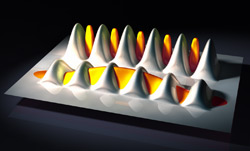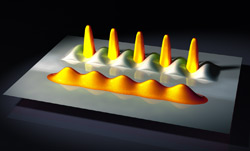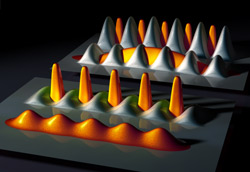Embargoed until 1:00 pm U.S. Eastern Time Wednesday, 28 July 2010
Pinning atoms into order
Fundamental physical phenomena demonstrated in Austria for the first time
In an international first, physicists of the University of Innsbruck, Austria have experimentally observed a quantum phenomenon, where an arbitrarily weak perturbation causes atoms to build an organized structure from an initially unorganized one. The scientific team headed by Hanns-Christoph Nägerl has published a paper about quantum phase transitions in a one dimensional quantum lattice in the scientific journal Nature.
With a Bose-Einstein condensate of cesium atoms, scientists at the Institute for Experimental Physics of the University of Innsbruck have created one dimensional structures in an optical lattice of laser light. In these quantum lattices or wires the single atoms are aligned next to each other with laser light preventing them from breaking ranks. Delete using an external magnetic field allows the physicists to tune the interaction between the atoms with high precision and this set-up provides an ideal laboratory system for the investigation of basic physical phenomena. “Interaction effects are much more dramatic in low-dimensional systems than in three dimensional space,“ explains Hanns-Christoph Nägerl. Thus, these structures are of high interest for physicists. It is difficult to study quantum wires in condensed matter, whereas ultracold quantum gases provide a versatile tunable laboratory system. And these favorable experimental conditions open up new avenues to investigate novel fundamental phenomena in solid-state or condensed matter physics such as quantum phase transitions
Quantum phase transition
The Innsbruck physicists have observed a “pinning transition“ from a superfluid (“Luttinger liquid“) to an insulated phase (“Mott-insulator“). In their experiment they showed that for strongly interacting atoms an additional weak lattice potential was sufficient to pin the atoms to fixed positions along the wire (“pinning”). The atoms were cooled down to nearly absolute zero and were in their quantum mechanical ground state. “It is not thermal fluctuations that induce the phase transition,“ stresses PhD student Elmar Haller, who is also first author of the study, which has been published in the journal Nature. “In fact, the atoms are already correlated due to strong repulsive interaction and only need a small push to align regularly along the optical lattice,“ explains Haller. When the lattice is removed, the atoms return to a superfluid state.
Theoretical prediction
The phenomenon observed by the experimental physicists was proposed by three theorists two years ago, two of whom - Wilhelm Zwerger and Hans Peter Büchler – also worked at the University of Innsbruck. With theorists and experimental physicists cooperating closely and a big pool of highly qualified scientists, the internationally renowned research centre for physics in Innsbruck offers an excellent framework for the experimental physicists of the research group headed by Wittgenstein awardee Rudolf Grimm to pursue basic research in physics. This research work is funded by the Austrian Science Fund (FWF), the European Science Foundation (ESF) and by European Union research programs.
Publikation: Pinning quantum phase transition for a Luttinger liquid of strongly interacting bosons. Elmar Haller, Russell Hart, Manfred J. Mark, Johann G. Danzl, lukas Reichsöllner, Mattias Gustavsson, Marcello Dalmonte, Guido Pupillo, and Hanns-Christoph Nägerl. Nature 29 July 2010. doi:10.1038/nature09259
Rückfragehinweis:
Elmar Haller
Institute for Experimental Physics
University of Innsbruck
Phone +43 512 507-6306 oder 6376
Email Elmar.Haller@uibk.ac.at
Web http://www.ultracold.at
Christian Flatz
Public Relations
University of Innsbruck
Mobile +43 650 5777122
Email Christian.Flatz@uibk.ac.at
Web https://www.uibk.ac.at


